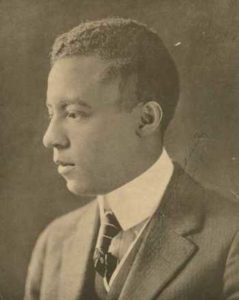
Frank Boyd
*This date celebrates the birth of Frank Boyd, who was born in 1881. He was a Black Pullman Porter and labor activist.
Born in Atchison, Kansas, his father was a former slave from Kentucky. Boyd spent his early years as the offspring of a struggling sharecropper. Shortly after his fourth birthday, his mother died, leaving him and his siblings with his father and relatives. A high percentage of youth in the sharecropping economy had to balance work life and school at an early age. Boyd was no exception. He worked odd jobs and tasks during the family’s migration between Kansas and Nebraska. Having little success sustaining livable wages, Boyd and one sibling moved and settled in St. Paul, Minnesota, in 1904.
He worked in a barbershop for several years before being hired as a Pullman Porter in 1907. By 1912, Frank Boyd was very involved in the issues and challenges of the Pullman Porter. Entrenched in white-supremacy tactics of racism, the Pullman Company in Illinois paid wages that were a notch higher than slave wages. Ironically, the company relied entirely on emancipated Blacks for decades as its primary hiring source for porters. Boyd challenged the $25 monthly earnings by organizing porters to sign a petition to raise wages to $60 after two years of service. The company responded by raising wages to $27.50 a month. Though the petition was unsuccessful, this effort catalyzed Boyd’s activism.
He became a champion in uniting porters and galvanizing the need for unionization. He was a part of the early attempts to form a union and, along with A.W. Jordon, successfully established the Brotherhood of Sleeping Car Porters Protective Union fraternal organization (precursor to the Brotherhood of Sleeping Car Porters Union) in 1919. The Pullman Company challenged and destroyed the fraternal organization; however, it helped fuel Boyd’s focus and determination for equitable wages. He briefly endorsed the company's Employee Representation Plan, chairing a committee in St. Paul, but soon realized it was “a form without the necessary substance to establish justice.”
On August 25, 1925, the Brotherhood of Sleeping Car Porters (BSCP), led by A. Phillip Randolph and Ashley Totten, was formed in Harlem, New York. Frank Boyd immediately joined the union and began organizing St. Paul Local #3. He resigned from the Employee Representation Plan and organized the first St. Paul’s BSCP meeting in September 1925. Boyd voluntarily supported the BSCP locally and nationally for 34 years. When the St. Paul assistant district superintendent of the Pullman Company, C. C. Healey, threatened his job, he declared his position by arguing for the rights and equality of porters.
Although membership in Local #3 grew, Boyd’s effectiveness in organizing porters squared him with the Pullman Company, and he was fired as a porter. Frank Boyd devoted his life to organizing the union and addressing social justice issues in St. Paul and Minneapolis. During the summer of 1930, Boyd mobilized hundreds of Rondo community members to protest the lynching of J.W. Wilkes, a Pullman porter murdered in Kansas by white supremacy because of his employment security.
In 1941, he was appointed to the NAACP’s “On to Washington,” a steering committee that had the sole purpose of mobilizing a march on Washington against job discrimination. Although the march was postponed, Boyd used this opportunity to champion the vocal presence in denouncing bigotry and prejudice in St. Paul's employment practices. Randolph exalted Boyd at a testimonial dinner ceremony in 1951, crediting the remarkable work of the union upon the work and shoulders of his excellence. His articles were published in the “Black Worker,” the BSCP national newspaper. Minnesota politicians recognized the power, integrity, and strength of Boyd’s activism. They elected him, along with Miss Alyce Anderson, the sister of the famed singer Marian Anderson, as an Electoral College delegate for the Democratic Party, making them the first two African Americans to hold the position.
Hopeful for the next generation, Boyd supported the younger generation with their growing involvement in social justice. With the increased use of air and bus travel, the number of Pullman passengers began to decline after the mid-1950s, and by 1961, only 3,000 porters had regular runs. Due to failing health, after the death of his wife, Boyd went to California to live with his son. He died there on May 2, 1962. His body was returned to St. Paul, and the Reverend Floyd Massey of Pilgrim Baptist Church committed him to his grave. He was interred in Elmhurst Cemetery. In 1976, Frank Boyd Park was established near the St. Paul Cathedral on Selby Avenue.